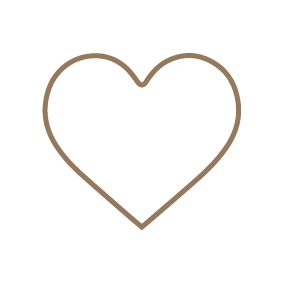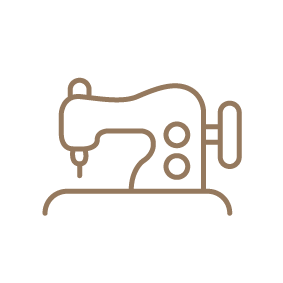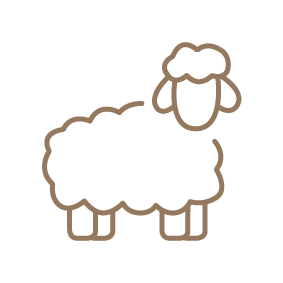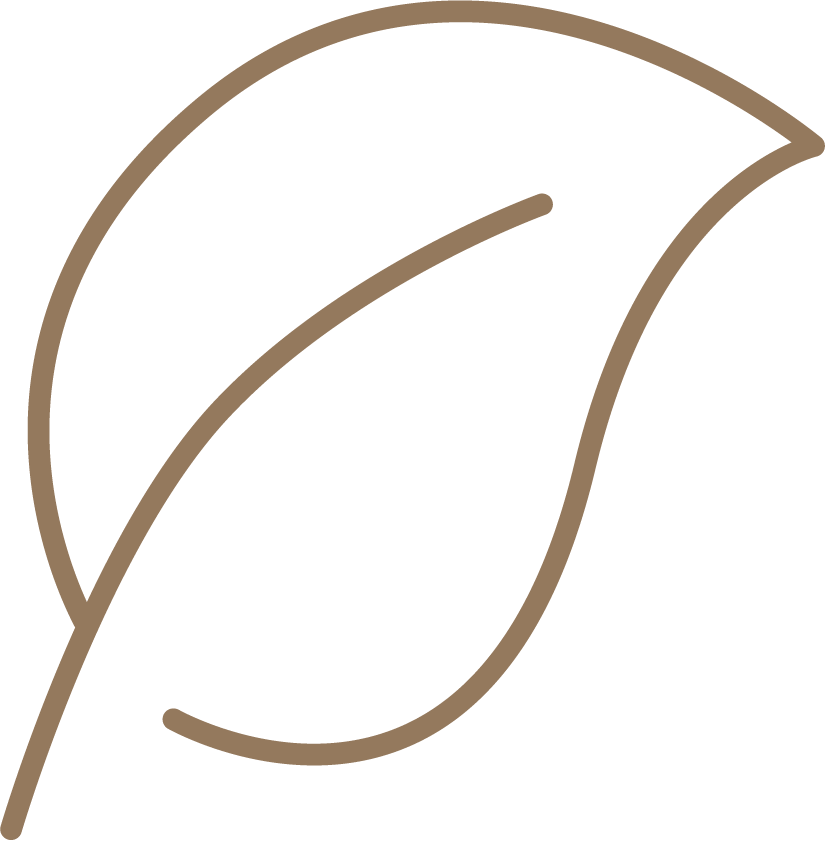FAQ & Glossary
Here we provide answers to the most common questions
Opening hours:
You can reach us at the following telephone numbers during our opening times:
You can find our gift certificates directly in our factory store in Pfullingen – and very soon, very conveniently also in our online shop.
So come and drop by every now and then!
Both our wool fleece and our boiled wool...
Yes, pilling and lint are normal on organic knitted wool. Pilling, the little knots, happens when materials rub against each other. Lint are those small loose fluffs that are created during the fleece production process. Fluff and pilling are actual features of natural wool products. Because our wool is naturally pure and hasn‘t been treated with chemistry, we can‘t entirely avoid these features. But there is something you can do about it:
- Use a lint roller or a pilling shaver
- Brush the fabric with a soft clothes brush
- Try using adhesive tape to remove lint
- Briefly place the clothes into the tumble dryer on cold temperature setting
- Do not use any fabric softener as this will increase pilling and damage the wool
All ENGEL wool and wool/silk items are made of the finest new merino wool. This has nothing to do with the “scratchy” wool that often comes to mind when people hear the word “wool”. Virgin merino wool is soft and smooth and does not scratch – the best way is to find out for yourself.
Apart from many other amazing characteristics, wool is also temperature balancing. That means, wool warms you when it is cold and cools you when it is warm. Besides, wool can absorb a third of its own weight in moisture without having a “wet” feel to it.
Vielen Dank für dein Interesse an unseren Produkten.
Wir freuen uns, dass du ENGEL Naturkleidung in dein Sortiment aufnehmen möchtest.
Bitte sende uns eine Kopie deiner Gewerbeanmeldung sowie eine kurze Beschreibung deines Ladengeschäfts – oder alternativ den Link zu deinem Onlineshop.
Nach Eingang deiner Angaben erhältst du von uns weitere Informationen zu einer möglichen Zusammenarbeit.
Wir freuen uns auf deine Nachricht und darauf, dich kennenzulernen.
The TOG system provides a unit of measure for the heat resistance of textiles. TOG stands for thermal overall grade and is used to describe the warmth or thermal resistence of a garment. The higher the TOG value, the warmer the sleeping bag. The following table shows which items of clothing the baby should wear inside the sleeping bag, depending on room temperature and the TOG value of the sleeping bag.

ATTENTION: This table only provides reference points. The appropriate clothing always depends on the room temperature and not on the season. ENGEL sleeping bags have the following TOG values:
- Terry sleeping bag: 0.64
- Fleece sleeping bag: 1.65
You can find all the information on GOTS and IVN in our encyclopaedia below.
ENGEL produces all its products in Germany. We work with several partner businesses in the South of Germany, most of them based within 50 km from our headquarters in Pfullingen. Here, in Pfullingen, we manufacture a good part of the products ourselves. That way, we guarantee short transport distances; which is good for the environment and helps us to stay flexible. On top of that, we can secure jobs in Germany.
In our tests (DIN EN 13758-1) the UV-protection of our materials wool and wool/silk was at least 22 to a maximum of 50 – depending on colour and quality.
(Please note! Wearing our clothes does not replace other UV protective measures.)
Besides the
material itself the following factors can influence UV protection:
- Material Structure:
Higher density and weight of the material increases UV protection.
- Garment Fit:
Stretched and tight-fit clothing offers less UV protection than lose-fit clothing.
- Colour:
Dark colours offer a higher UV protection than light colours.
- Humidity:
Wet clothing reduces UV protection.
- Use:
Fading colours and abrasion of fibres reduces UV protection.
- Layering:
Wearing more than one layer increases UV protection
We care deeply about the mindful use of clothing. We know that it is often difficult to find the right size online – that's why we want to support you as best we can and work together to reduce the risk of items having to be returned.
On each product you will find a size chart with instructions on how to measure yourself. You can find an overview here.
To protect our environment, returns are not free of charge. We share the return costs with you so that we can take responsibility together. This allows us to reduce transport routes, packaging waste and CO₂ emissions. Find out everything you need to know about our returns process here.
https://engel-natur.de/media/3e/49/db/1764585749/How to find the right size at ENGEL.pdf?ts=1764585749
All ENGEL products are produced in Germany under fair working conditions. 95% of our range of goods is certified with the Global Organic Textile Standard (GOTS) or with the world's most demanding quality mark IVN-Best. Along the strict ecological guidelines, these two standards also include social criterias that must be complied with in order to receive the certification. This contains the ILO (International Labour Organisation) core standards: such as the prohibition of forced labour, prohibition of child labour, no abuse and discrimination, fair pay, occupational health and safety and freedom of association.
All ingredients used in ENGEL products are nickel-free and not harmful to health or considered to be a health concern.
It is not necessary to wash our products before wearing them for the first time.
- Wool cycle or hand wash – do not use the delicates cycle! When hand washing wool, do not rub and wring too much and soak too long. Slight swirling and gentle squeezing in lukewarm water are sufficient. It is particularly important that you always use the same temperature.
- Use a detergent for woollens (pH value < 7). Do not use any softener!
- »Cold« or at max. 30°C in wool cycle. That keeps the wool soft, elastic and absorbent.
- Wash at a low spin speed! We recommend a maximum of 400 rpm (revolutions per minute).
- Wrap in a towel and gently squeeze out the water. Carefully pull into shape. Dry flat – not in a tumble dryer or on a heater!
Clothes moth
For a long time, we were searching for a new and more sustainable packaging solution for our high-quality products. The packaging is supposed to meet several criteria: to protect against dirt, moisture and pests such as moths. Many other types of packaging (including the option to leave the items unpacked) can‘t fullfill this criteria unfortunately. For this reason, we have decided to use a bag made of recycled polyethylene (RE PE).
Thanks so much for your interest in our products.
Everything you need to know about mulesing you can find in our encyclopaedia below.
ENGEL policy statement
- UN Human Rights Charter
- UN Guiding Principles on Business and Human Rights
- UN Convention on the Rights of the Child
- UN Convention on the Rights of Women
- Core labour standards of the International Labour Organisation (ILO)
- OECD Guidelines for Multinational Enterprises
- The ten UN Global Compact Principles
Responsibility and claim
In our webshop, you have the opportunity to pay convenient with Klarna. Simply select Klarna as your payment method at checkout – then choose between pay later, pay in installments, or instant payment. Klarna will handle the payment process directly. After your purchase, you’ll receive an email with all the payment details. Please note: your purchase contract stays with us, but the payment itself goes through Klarna. You can find more information directly on Klarna’s website.
Glossary
Term definitions from A to Z
Short fibres that have come off during the combing process of waste silk spinning and the short and tangled fibre particles of the innermost and outermost sheathing of the silk moth cocoon yield semi fine to rough natural silk yarns – bourette silk – which is of mostly irregular and knobby appearance. This silk is duller, but also more full-bodied than silk waste.
 Normal wash cycle
Normal wash cycle  Gentle wash cycle
Gentle wash cycle  Special gentle wash cycle (delicates)
Special gentle wash cycle (delicates)  Hand wash
Hand wash  hot ironing
hot ironing  moderately hot ironing
moderately hot ironing  do not iron hot, caution when ironing with steam
do not iron hot, caution when ironing with steam  do not iron
do not iron  Drying with normal thermal stress
Drying with normal thermal stress  Drying with reduced thermal stress
Drying with reduced thermal stress  No tumbler drying possible
No tumbler drying possible  Chlorine bleach and oxygen bleach permitted
Chlorine bleach and oxygen bleach permitted  Only oxygen bleach permitted/no chlorine bleach
Only oxygen bleach permitted/no chlorine bleach
 Do not bleach
Do not bleach  No dry cleaning possible
No dry cleaning possible  No wet cleaning possible
No wet cleaning possible 






Organic virgin wool is characterised by the respect for animals and human beings. The merino sheep can live in a healthy and stress-free manner according to their needs and their species. Pastures must be selected in accordance with the climatic and ecological conditions that suit the merino sheep, the use of pesticides is forbidden both on the pastures and on the animal. The animals reproduce in a natural manner and interventions with the animal, such as tail docking or mulesing are forbidden. In short – the sheep are living a happy life.
This term refers to the seed hair of the cotton boll, which bursts open when fully ripe. It grows in a tropical and subtropical climate. Cotton from ENGEL is strictly hand-picked, always originates from controlled organic cultivation and is therefore free of pesticides, artificial fertilisers and herbicides. Apart from a considerate treatment of nature, a fair cooperation with the producers is guaranteed. Natural cotton is very skin friendly and therefore particularly well suited for sensitive skin, but at the same time extremely durable and hard-wearing. Moreover, textiles made of natural cotton wool are anti-static and colour-fast and can be washed in the washing machine at high temperatures.
is the general term for all textile finishing methods, which change the visual appearance, which are the wear or care properties of a commodity following weaving or knitting. A distinction is made between mechanical and chemical finishing.
The Global Organic Textile Standard (GOTS) is recognised as worldwide leading standard for the processing of textiles made of biologically produced natural fibres. The standard defines environmental requirements throughout the entire textile production chain on a high levels and at the same time demands compliance with social criteria.
ENGEL offers products that are certified with the GOTS. To be able to continue these certifications, we must be recertified by an independent organiation every year to guarantee a transparent, fair and ecological production.
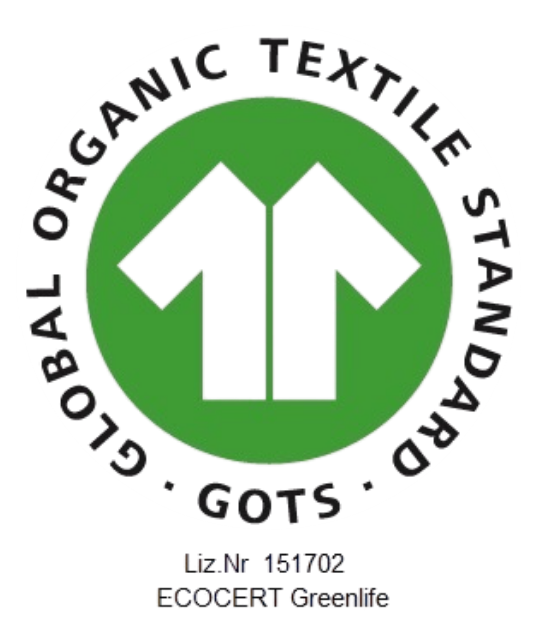
Elastic, double-faced flat or circular weft-knitted or warp-knitted knitwear, which on both sides of the fabric only exhibits plain stiches but is not ribbed. Two plain-plain knitted fabrics are joined together in such a manner that a plain stitch on the front is opposed by a slightly offset plain stitch on the rear. This results in an exceptionally fine and smooth loop structure. The fabric has a very supple appearance.
Products carrying the seal “IVN certified BEST – Natural textile” are produced according to the highest possible ecological standards and thus clearly even surpass the requirements of the GOTS.
Products that are certified with the IVN Best must be produced from 100% controlled organic natural fibres.
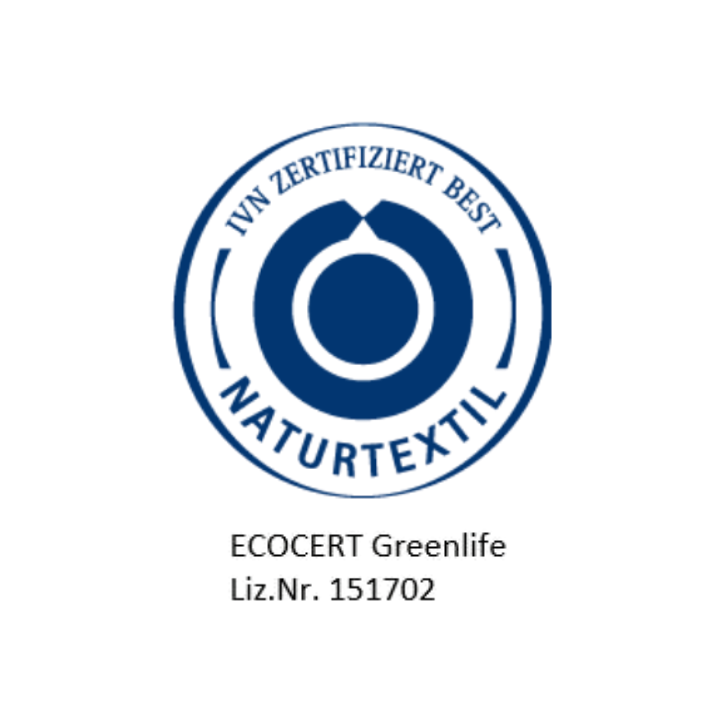
Mulesing For climatic reasons, sheep, particularly the very woolly merino sheep, are subject to infestation with the blowfly, especially in Australia and New Zealand. The fly thrives mostly in regions with permanently green ground cover, i.e. regions with frequent rainfalls. The climate is rather continental and only exhibits slight seasonal fluctuations, except for the South of Australia.
Quality mark for natural textiles granted by the International Association of the Natural Textile Industry (IVN).
Nickel is a silvery-white metal and the most frequent trigger of contact allergies. It is estimated that approx. 2 million people in Germany are sensitised to nickel. Besides, inhaling inorganic nickel compound leads to an increased risk of lung cancer. This is why ENGEL only uses nickel-free materials for press studs and other closures.
In the textile sector, “organic” is not a protected term so that when you encounter this term it is not guaranteed that the products were manufactured according to ecological guidelines. The same applies to terms such as “natural”, “nature”, “healthy” or “ecological”. To be sure about organic products, you can pay attention to certifications such as “controlled organic cultivation” and the quality marks “NATURTEXTIL-IVN ZERTIFIZIERT BEST”, “GLOBAL ORGANIC TEXTILE STANDARD (GOTS)”, “BIOLAND” and “DEMETER”.
organic cotton only permits natural fertilisers and prescribes a cultivation with crop rotation (e.g. with grain or different types of vegetables such as sweet corn, beans, peanuts). That means that cotton is cultivated without chemical fertilisers and without the use of pesticides according to biodynamic guidelines. Thus, only soils are cultivated that have not been treated with chemicals for several years. Weeds are removed by hand, while pests are controlled through mixed cultivation and the introduction of beneficial insects. Biotopes that are set up, for example hedgerows and trees, serve as nesting sites for birds and small animals. Green manuring and alternating crop rotation enliven the soil and produce bigger harvests. Depending on the degree of ripeness of the cotton bolls, harvesting is carried out in 3 to 4 manual picking processes.
More and more children and adults suffer from neurodermatitis. Therefore it is essential to avoid allergens as early as possible, especially during the first months of life. Not only the large skin surface, but also the initially weak immune system lead to a high sensitivity of babies' and children's skin to harmful substances.
Sleeve cut, where sleeve and shoulder portion consist of one part. The raglan seam runs from the neck ring across the breast and diagonally across the back to the armhole.
is obtained from the cocoon of the wild silk moth. It designates the long staple fibres that are spun to tussah silk using the spun silk spinning method.
The silk thread is an animal protein fibre that is won from the cocoon of the silkworm. Its structure and properties are similar to wool fibres. The extraordinarily long fibres of natural silk, their tensile strength, yarn count and their characteristic touch turn them into one of the most precious and valuable textile materials. Silk has the gift to regulate the temperature and is particularly skin-friendly, so it is also very suited for people with sensitive skin.
The skin is our largest and most important sensory organ. It serves us humans as protective shell, senses soft touches just as much as pain, pressure and temperature and regulates our entire heat and moisture balance. Depending on the degree of physical exertion, the skin releases 1 to 2 litres of fluid every day to cool the body through the sweat glands.
Wool fibres are protein fibres, and their composition is similar to the human skin. Only the hair of sheep is referred to as wool. All other animal hair, whether obtained from lamas, vicunas, goats, angora rabbits and camels, is not defined as wool although they are all very similar in structure. These are all protein fibres that consist of keratin (horn). Wool fibres have a characteristic structure due to their fine scales that are layered in a tiered structure. When treated incorrectly, these outer scales can become so entangled that the scales firmly interlock, that means the wool turns mat. Virgin wool describes wool fibres that are won by shearing living sheep. Only the primary processing may be referred to as pure virgin wool. Virgin merino wool comes off the merino sheep; it has a fine curl and is supple and soft.
Wool is very elastic. It is dirt- and water-repellent. Wool provides a temperature balancing and heat-regulating effect. It keeps you warmer than any other material. It regulates skin perspiration and the exchange of oxygen. It can absorb up to 1/3 of its own weight in moisture without feeling wet. Thanks to the dirt-repelling habit, frequent washing is unnecessary as wool regenerates itself in combination with oxygen-rich air, i.e. by airing outside.
